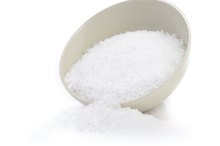Low Sodium Levels & Agitation
Hyponatremia is a condition characterized by abnormally low levels of sodium. Sodium helps regulate the amount of water inside and around your cells. When your sodium levels become too low this causes the water levels in your body to increase and your cells to swell, MayoClinic.com explains. Hyponatremia causes a number of symptoms that affect your state of mind such as confusion, anxiousness and irritability. Severe hyponatremia sometimes causes unconsciousness and even coma. Seeking immediate medical attention helps lower your risk of experiencing other complications from low sodium.
Sodium Levels and Risk Factors
It is possible to determine your sodium levels through a blood test. The range of what is considered normal varies slightly among different laboratories. Nevertheless, sodium levels between 135 mEq/L and 145 mEq/L are generally considered normal, MedlinePlus, a service of the National Institutes of Health, notes. Factors such as taking diuretic medications, recent physical trauma and eating a low salt diet raise your risk of developing hyponatremia. Intense physical activities and medical conditions such as kidney disease also affect your risk, MayoClinic.com says.
Sodium and Mood
Salt & Anxiety
Learn More
A 2008 issue of “Physiology & Behavior” featured a study that discussed various experiments involving induced hyponatremia that linked sodium levels and clinical depression. One particular experiment mentioned in the study involved the use of rat test subjects that exhibited symptoms consistent with depression after their sodium levels dropped below normal levels. The study posited a link between salt craving and mood. The study even suggested the possibility of salt being akin to addiction hence the negative effect of low sodium levels on mood. More research, however, is necessary to validate this assertion.
Salt-Sensitivity and Agitation
A German research team conducted a psychological evaluation of the effect of mental stress and increased blood pressure on salt-sensitive volunteers. Salt-sensitive people apparently have an increased susceptibility to emotional irritation and lower anger management when under duress compared to people that are not salt-sensitive, according to a study published in a 1999 issue of "Psychotherapie, Psyhocomatik, Medizinische Psychologie," Moreover, the elevated degree of anxiety and irritation caused by stress also increased blood pressure. It is possible that hypernatremia elicits a similar irritable emotional response as the stress. More research, however, is necessary to examine the relationship between sodium levels and mood among salt-sensitive and normal people.
Severe Hyponatremia and the Young
Argentum Nitricum for Anxiety
Learn More
The “Sultan Qaboos University Medical Journal” featured a study in a 2006 issue that assessed the incidence of hyponatremia in young hospitalized patients and found that 20 out of 3,561 patients that were aged 18 or younger developed severe hyponatremia as a result of receiving hypotonic intravenous fluids. The study further determined that about 60 percent of the 3,561 patients developed hyponatremia and exhibited increased irritability as a result. This is significant because low sodium is generally more common in older adults, MayoClinic.com says. Further research is necessary to examine the link between hyponatremia and age.
Related Articles
References
- MedlinePlus; Sodium; David C. Dugdale; November 2009
- "Psychotherapie, Psyhocomatik, Medizinische Psychologie"; Emotional Irritability and Anxiety in Salt-Sensitive Persons at Risk for Essential Hypertension; Buchholz K, et al.; August 1999
- "Physiology & Behavior"; Salt Craving: The Psychobiology of Pathogenic Sodium Intake; Michael J. Morris; August 2008
- "Sultan Qaboos University Medical Journal"; Incidence and Outcome of Severe Hyponatremia in Children and Young Adults; Zakia Al-Lamki, et al.; June 2006
Writer Bio
Joseph Pritchard graduated from Our Lady of Fatima Medical School with a medical degree. He has spent almost a decade studying humanity. Dr. Pritchard writes as a San Francisco biology expert for a prominent website and thoroughly enjoys sharing the knowledge he has accumulated.









